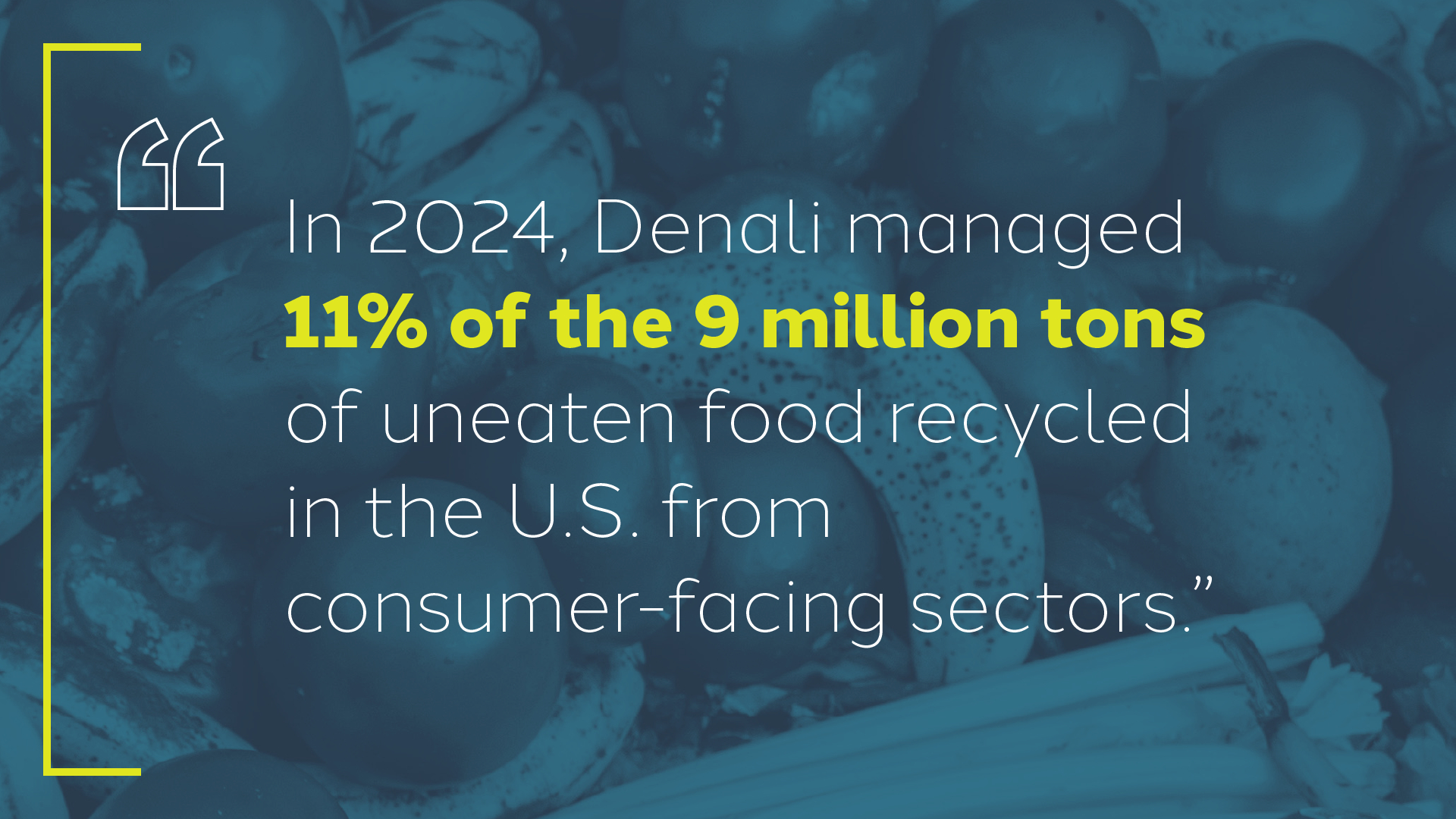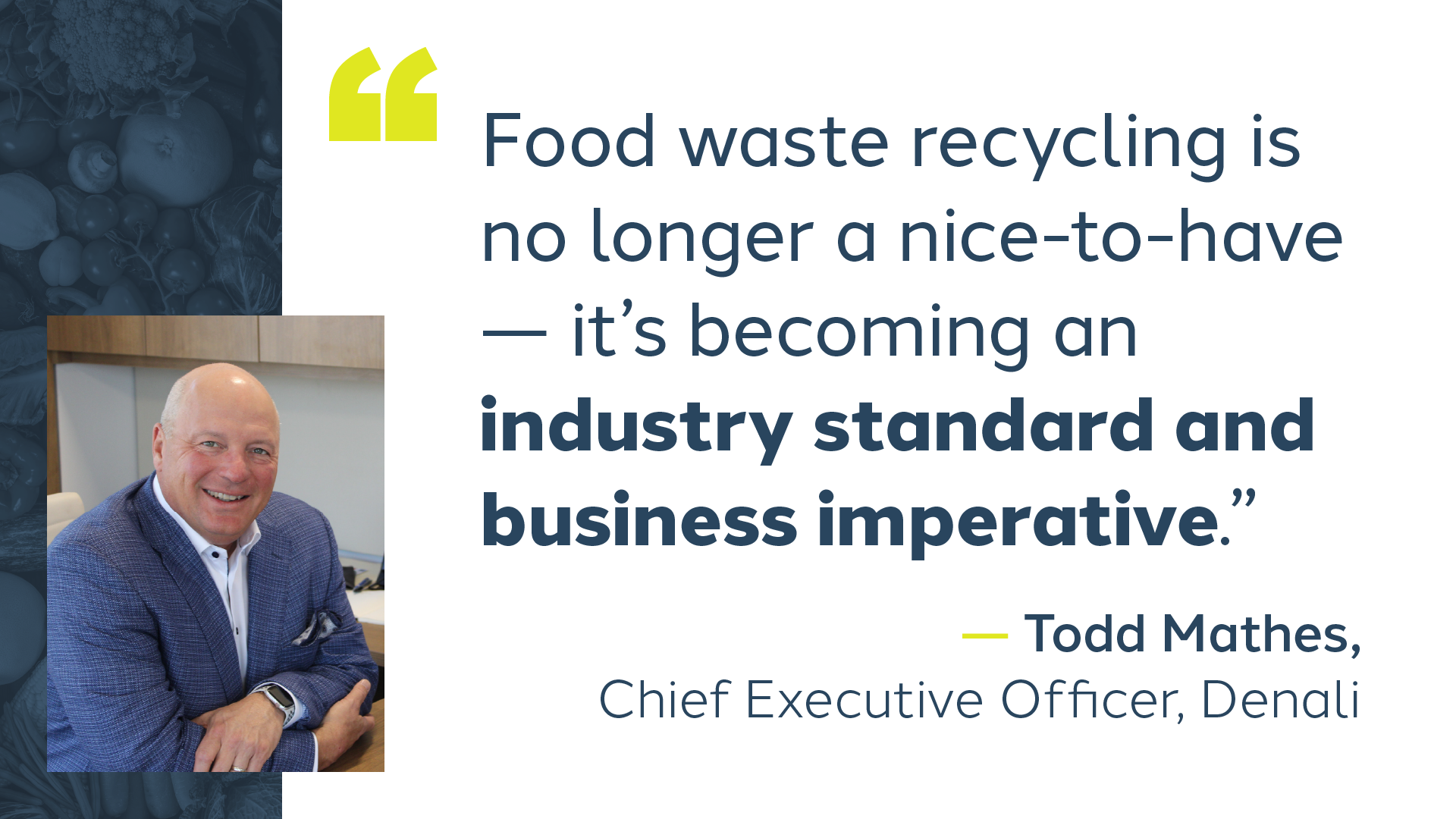Food waste is a massive global problem with massive implications. Research shows that in the U.S., “surplus food” — that which is produced in the supply chain but goes unsold or uneaten — totaled more than 70 million tons in 2023, with more than 31 million tons going to landfill, incineration, drain and dumping. That’s enough food to provide one meal each day for every person in America for an entire year, based on Feeding America estimates of four pounds per day per person.
This surplus translated to over $108 billion in lost value for food processors and consumer-facing businesses.
The transformative answer to this problem is prevention: finding ways to reduce the amount of food and organic byproducts that go unused. People and organizations around the world are making progress. But food production processes will always yield a certain amount of excess. Preventing the generation of waste and donating unsold food are always the top priority, with recycling wasted food an important alternative.
We are dedicated to being a key part of the solution and empowering our customers to do so. In 2024, Denali managed 11% of the 9 million tons of uneaten food recycled in the U.S. from consumer-facing sectors. Here’s a deeper look at the challenges posed by waste and the new management tools and diversion techniques being developed to overcome them.
What Is Food Waste?
Food waste is an unusual term since there are multiple ways to extend and renew the life of food. It isn’t just the leftovers scraped off a plate — it’s any food that was grown, processed and transported but never ultimately eaten. That includes blemished produce rejected before it reaches the shelf, unsold and unconsumable items tossed by retailers, leftover fries from the ballpark, and spoiled or excess ingredients at restaurants or cafeterias.
It represents a major sustainability challenge, but also an opportunity: to recognize unconsumable food as a valuable resource instead of waste. By improving how this food and other organic byproducts are collected and repurposed, we can keep it out of landfills and recycle it to enable a circular economy and improve the environment.
The Cost of Traditional Disposal
The business impact of surplus food and organic waste is striking, costing businesses more than $100 billion last year. This number reflects the resources spent growing, processing, transporting, storing, merchandising, and off-shelfing food.
Beyond these impacts, there are additional implications for companies to consider:
-
- Resource inefficiency: Food that is thrown in the trash doesn’t just equate to loss — it equates to lost opportunity. Recycling food into beneficial products such as animal feed, biofuel, compost, organic fertilizer, and secondary ingredients contributes to a robust food supply chain.
- Increased regulatory scrutiny: Multiple states have enacted legislation that requires wasted food to be recycled or kept out of landfills. Most of this legislation is aimed at businesses, but moving toward residents, too.
- Missed opportunities: In the age of social media and increased transparency, word quickly gets around among consumers. Being viewed by consumers as a company that cares about food waste prevention and food recycling — and takes action — is good for business.
- Negative environmental impact: According to the United Nations, food loss and waste generate 8 to 10% of greenhouse gasses worldwide. The EPA estimates that 24% of U.S. landfill inputs come from uneaten food, and emit methane, a greenhouse gas that is 26 times more powerful than carbon dioxide.
- Societal impact: There is a great deal of time, energy, and labor involved in producing food. When that food is wasted rather than recycled, it diminishes the value of that labor.

Mitigating the Impact of Food Waste
There are small things that people can do every day individually to help reduce food waste, from shopping smarter to storing food properly and getting creative with leftovers. However, for a global challenge of this magnitude, scalable solutions are needed.
One of the most powerful industrial practices available for tackling food waste head-on is organics diversion. This involves preventing organic materials like unconsumable food and other organic byproducts from being sent to landfills or incinerators, instead directing them to beneficial uses such as feed, fertilizer and fuel.
In 2024, we partnered with customers and recyclers across the country to create the following positive impact:
- Creating over 1 billion pounds of nutritious animal feed.
- 12.1 billion pounds of compost, mulch and soil amendment processed and distributed.
- Over 533 million pounds of renewable energy developed with unused cooking oil.
Our CEO Todd Mathes recently shared: “food waste recycling is no longer a nice-to-have – it’s becoming an industry standard and business imperative.”

The Future of Food Waste Management
The world is coming together to collectively address this issue and its harmful impacts. We are leading the charge, but there’s much more work to be done. Technology and innovation are opening doors and unlocking capabilities for better management of unconsumable food, ranging from real-time monitoring of food’s shelf life, and refined data analysis to advanced processes and new compost products.
More than a year ago, we rolled out mechanical depackaging across the U.S., streamlining the previously manual process of removing packaging from food products in order to make recycling more efficient. This year, we designed a mobile depackaging unit for more effective, on-site emergency response to customers.
We also developed ReCirculate™, a unique circular compost product produced from recycling unsold food collected from grocery customers. Rather than going to the landfill, this food material is converted into a soil amendment product that helps create and grow healthy lawns and gardens. Grocers complete the circular use by providing ReCirculate on store shelves.
These examples highlight just a few of the innovative ways organic waste can be repurposed into valuable resources. From specialized compost blends and fertilizer to renewable energy derived from anaerobic digestion, the potential applications are continually expanding. As more companies invest in sustainable practices, new solutions will emerge — solutions that continue to raise the bar on reducing waste.
Read more about our environmental impact: Denali Takes Organic Recycling to New Heights, Recycling 14 Billion Pounds of Organic Materials in 2024
Your Partner for Food Waste Management
Tackling this issue is one of the defining sustainability challenges of our time — but it’s also one of the greatest opportunities. Every pound of food diverted from landfill is a step toward reducing greenhouse gas emissions, protecting natural resources and giving food new life by recycling it into new products. As innovation continues to accelerate, from advanced recycling processes to circular products like ReCirculate, businesses have more tools than ever to make meaningful change.
We believe the future of food waste management is one where “waste” is seen as a resource, not as trash — where every scrap is repurposed into something that replenishes the planet, powers communities and fuels growth. Together with our customers and partners, we’re committed to building that future, and proving that when it comes to food waste, progress is possible — and transformation is within reach.
Contact us and learn how we can support your journey to combatting food waste and unlocking a circular economy.






